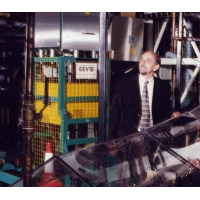Exploring the Cosmos

Lancaster University shares multi-million pound boost for particle physics
Lancaster University is to play a key role in a £21 million research programme exploring the building blocks of the cosmos.
As part of this programme, physicists and engineers from Lancaster will carry out research at the new £7.03m Cockcroft Institute next to the Daresbury Laboratory site in Cheshire, a new centre to be dedicated to particle accelerator research and development. The new National Centre for Accelerator Science is the outcome of a successful joint bid from Liverpool, Lancaster and Manchester universities and the Daresbury Laboratory.
Head of Lancaster University’s Particle Physics Research Group Professor Peter Ratoff said: “Accelerator Science is a vital tool for attempting to understand what the universe is made up of, by breaking it down into its tiniest constituents. To do this scientists recreate the moments after the big bang by using a particle accelerator – a high-energy machine that speeds particles up using high-frequency electric fields. As they approach the speed of light, they collide with one another breaking down into smaller units – the fundamental building blocks which make up the universe “.
Professor Richard Carter, leader of Lancaster University’s Microwave Research Group in Engineering, was one of the initiators of the successful proposal.
He said: “The decision by PPARC will enable groups in the Universities of Lancaster, Liverpool and Manchester to work with colleagues at the CCLRC Daresbury Laboratory to create an international centre of excellence based on existing research strengths in the North-West. It fills a vital gap in British research provision by recognising the importance of particle accelerator technology to a wide range of scientific, medical and industrial applications.”
Theoretical physicist Professor Robin Tucker was the third Lancaster member of the successful consortium, and his expertise in modelling electromagnetic systems will provide a valuable bridge between the physicists and engineers involved in the project.
Funded by the Particle Physics and Astronomy Research Council (PPARC) in partnership with the Council for the Central Laboratory of the Research Councils (CCLRC), The Cockcroft Institute will bring cutting-edge science to the North West and create a world-class centre for academics working on of some of science’s most fundamental questions. PPARC is providing £7 million over the next 8 years and the North West Development Agency (NWDA) is contributing up to £10M to house the Institute.
As part of the project, several new posts in Engineering and Physics at Lancaster will be funded to work on areas of science and technology relating to accelerator science.
The institute will open the door to substantial commercial opportunities as well as acting as a centre for the design, construction and testing of components for accelerator systems.